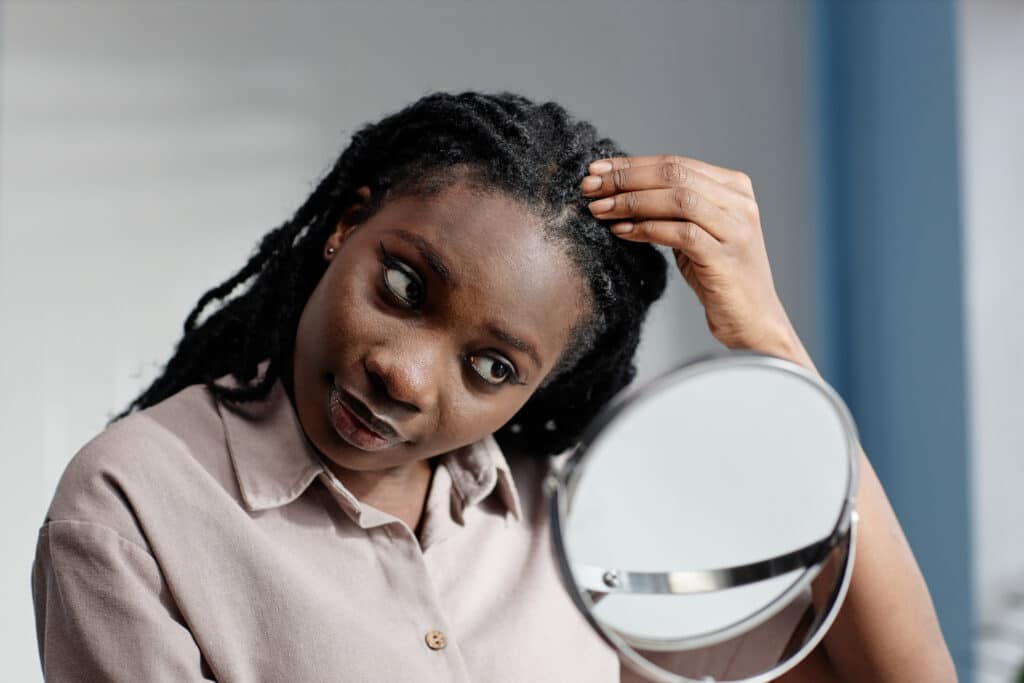
When you look at your hair–how healthy or unhealthy it is–many people look at what you put on it. But in actuality, the health of your hair has a lot to do with what you put in your body. Take dandruff, for example. Most would think it has something to do with a dry scalp or putt the wrong product on your hair. But did you know that the food you eat can cause those flakes to appear? It’s true.
What is Dandruff?
There is a microscopic fungus called Malassezia that lives on all of our heads. This yeast–a single-celled fungus–doesn’t do any harm, surviving off the natural oils present on our scalp and leaving oleic acid as a by-product.
Unfortunately, many of us are sensitive to oleic acid. Malassezia’s by-product can irritate the skin, leading to the body fighting back by increasing skin cell turnover.
Basically, your body tries to get rid of the problem by shedding irritated skin.
When this happens, symptoms include:
- flakes
- Itchy skin
- A red, irritated scalp
The Food & Scalp Connection
Inflammation is the body’s natural response to threats, such as injury or an allergic reaction. Blood rushes to the affected area resulting in swelling, or heat and pain.
So, what is the link with our diets? A diet rich in sugary, low glycaemic index foods can encourage inflammation. Think processed foods and simple carbs – they offer little nutritional value and can cause insulin spikes.
Insulin spikes can be harmful in terms of inflammation. They may also be linked to oily skin. We all know the feeling when our skin isn’t looking its best after days of junk food.
When we flood our bodies with highly processed foods, full of bad fats and sugar, our insulin spikes to counteract the sugar. In turn, we experience a flush of hormones which may stimulate oil production.
This can present as overproduction of sebum – the oily substance that comes from our follicles and other “waxy” areas of the body. On the face, this may result in spots, but on the scalp, it could just cause those unwanted flakes.
Foods that can Cause Dandruff
Refined Sugar
It’s a chain! Sugar in any form spikes insulin formation in our bodies that in turn triggers the output of oil, leaving an unhealthy, dry and flaky scalp. Result? Dandruff. Sugar in any form, refined or processed, leads to inflammation in our bodies that promotes flakiness. The solution is to cut down on some sugar from your diet to curb the side effects.
Various Cheeses
A cheese platter, cheese-burst pizza, cheesy sandwich, or a dish with cheese for topping, which one did your mouth water for? As delicious as they sound/taste, cheese instigates dandruff. While the reason for dandruff is still unknown, researchers claim that cheese is hard to digest and contributes to body inflammation, which adds to the chain, causing dandruff.
Dairy Cream
Another full-fat dairy product, cream, is a promoter of the lousy dandruff flakes on your scalp. Cream causes inflammation and boosts itchy and flaky scalp. Hence, it is ideal to part ways with the delicious fatty ingredient to avoid dandruff.
White Wine
Soothing your senses with a glass of white wine and your favourite music always seems the perfect plan to end a tiring day. Well, think before you pour that wine. White wine is sweet and is known to disrupt your body’s blood sugar level, increasing your scalp’s flakes. It’s now your call between white wine and dandruff.
Champagne
Toasts and celebrations always remind us of champagne. But wait, hear us out before you plan your next drinking plan. Like white wine, champagne is sweet and affects your body’s blood sugar levels, thus promoting dandruff.
Caffeine
Have you ever counted the cups of coffee you consume while running from one meeting to the other? Well, the amount of caffeine you ingest can aggravate your dandruff problem. This is simple – Caffeine is a diuretic, which means it increases the excretion of water from your body, leading to dry skin. This can worsen your existing condition and make your scalp extremely flaky. Caffeine is not just a part of your daily dose of coffee but also present in aerated sodas and drinks.

Healthy Foods for a Healthy Scalp
So now we know what to watch out for, what should we be incorporating into our diets?
B vitamins
Biotin (part of the vitamin B family) and vitamin B2 both contribute to the maintenance of your skin. Biotin rich foods include eggs, spinach, almonds, cauliflower and sweet potato, whist sources of B2 vitamins include fish, avocados, eggs and asparagus.
Zinc
Zinc is a common ingredient in medicated shampoos, but it also contributes to the maintenance of normal hair. Foods rich in Zinc include meat, shellfish, legumes, seeds and nuts.
Selenium
Selenium is a mineral found in foods such as brazil nuts, fish, sunflower seeds and spinach and contributes to the maintenance of normal hair.
Omega-3s
Omega-3 fatty acids make up the membranes that surround your cells, and they’re crucialTrusted Source for the functioning of many of your body’s systems.
A deficiency of omega-3s may cause a scaly, itchy, or rough rash to appear. They’re important for your skin health since they help:
- maintain your skin’s moisture barrier
- prevent premature aging
- promote wound healing
Omega-3 fatty acids may also help reduce inflammation, which may relieve:
- scalp irritation
- psoriasis
- dandruff symptoms
Additionally, a healthy protein and Vitamin B-rich diet are just what you need by your side in these hard times, and soon, these dandruff days too shall pass. It may sound disheartening, but a slight restriction on the food intake mentioned above can help you pause to dandruff. We hope the above list helps you plan an effective diet for your scalp.









